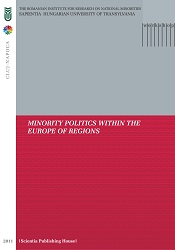Szeklerland: the Touristic Way to Autonomy
Szeklerland: the Touristic Way to Autonomy
Author(s): Benedek Nagy
Subject(s): Politics / Political Sciences, History, Economic history
Published by: Scientia Kiadó
Keywords: Szeklerland;autonomy;Romanian majority;Szeklers;tourism;regionalisation
Summary/Abstract: The main purpose of our short article is to outline if there are other possible ways for obtaining the so much desired autonomy. The political way is already very much exploited and probably efficient, too, to a certain extent. But probably there would be a need for some other ways of communication, too, for convincing the Romanian majority about the existence and the importance of an ethnic minority such as the Hungarians in Transylvania, and within that, the Szeklers. In the first part, we try to present the current political and public life events and evolutions in our region, to demonstrate that there is a strengthening internal will to have a self-governing structure for Szeklerland and to have common projects, so to say, Szekler regional initiatives. These were absent in the 1990s, but now we can experience a rise in the number and quality of the different kind of Szekler „products”: common development projects, tourism initiatives, communication, scientific works, and so on. In the second part, we present the tourism-related communication and the symbols used for these purposes, as well. What are the regional symbols, who use them, and how much are they unified and conceptually settled? The third part should bring foreign, best-practice examples in Europe, where the local tourism and communication has contributed to the process of regionalisation not only through the gained incomes and taxes but also by the changes they have achieved with the communication and proclamation of the distinct elements of the local cultures. This way, if used with a very conspicuous manner, tourism can have – in our belief – a double positive effect: beside generating a wide range of healthy economic effects (we are not going to deal with them in this paper), it can also persuade a very opposing national majority about the importance of preserving cultural heritage, different ethnic values, and, above all, that difference does not necessarily mean segregation, or exclusion.
Book: MINORITY POLITICS WITHIN THE EUROPE OF REGIONS
- Page Range: 527-547
- Page Count: 21
- Publication Year: 2011
- Language: English
- Content File-PDF

